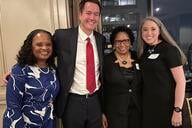You have /5 articles left.
Sign up for a free account or log in.
This week, I’m watching an all-too-familiar experience for communications professionals unfold as the University of North Carolina social media team is attacked on, ironically, social media for capturing and sharing a campus tradition that some believe should have been canceled during the pandemic. They posted about it, but the decision to hold that event was not made by the social team. In this instance, like many others, communications critiques are a proxy for displeasure with leadership decisions. Viewing them as anything less undermines the feedback to campus leaders, which should inform their strategic next steps.
The mocking comments and outrage shared online for decisions made by campus leaders unfairly target social media staff and the communicators for the institution. Taking the overall feedback and shaping it into actionable response should be part of the job, but the personal attacks should not be -- and they shouldn’t be condoned.
Before and especially during the pandemic, I’ve seen an unhealthy cycle experienced by my colleagues across institutions. Decisions are made by leaders at institutions, they are communicated, people disagree with them and their disagreement is aimed at the communicators. And then the cycle begins again.
As communicators we have a limited toolbox of words, platforms and approaches to share information. Throughout the pandemic we have done our best to use a mix of methods and speakers to help personalize messages often met with emotion. Yes, sometimes we mismatch the approach with the situation, but often we are using the hand we are dealt in the timelines others set into motion. We receive the anger if there is disagreement with the decisions made and the upset for any lack of timely decision making.
Early in the pandemic, I received and responded to the feedback from one institution’s general email line. I got to see and responded to the angry messages, many of which were inappropriate for any workplace, that I’m guessing the senders thought might never be read. As someone who was external to the institution, I could take a step back and distill if there was a communications takeaway, a leadership critique to be shared and at what level of the institution it should be forwarded, or if there was new information that could inform the COVID-19 response. Most of the comments purported to be about communications but really were about institutional crisis implementation and approach. And those two topics aren’t for communicators to own. Our role is to advise on response strategy and then share decisions with constituents.
Another of my clients sent a survey in the middle of last summer to their campus that covered a variety of issues. In it they asked how pleased the campus community was with pandemic-related communications as the only feedback point associated with their COVID-19 response. At my urging, they added questions that would remove communications as the only office to receive feedback on this complex and emotional topic, because there was much more to learn. Rounding out the questionnaire to include evaluation of the timelines for decision making, policy and protocol approach, and communications provided greater context and more actionable data. The responses suggested additional work was needed by many on campus and repositioned responsibility across multiple areas -- including the office of the president and senior campus leaders.
For UNC, let’s take those communications team members out of the crosshairs for the event’s existence this year and instead direct constructive feedback to the offices that approved the tradition or didn’t put steps in place to prevent it. It is critically important for feedback loops to exist for communicators to do our jobs; we must manage the expectations set by leadership for how and what we do in our positions. And we are willing to own our successes and our failures, but continuing to put our positions on the front lines of responsibility for all actions of an institution needs to stop. At a time when we all are asking for understanding, empathy and community in our lives, we should extend that graciousness to the communicators in our workplaces.
Teresa Valerio Parrot is principal of TVP Communications, a national public relations agency focused on higher education.




